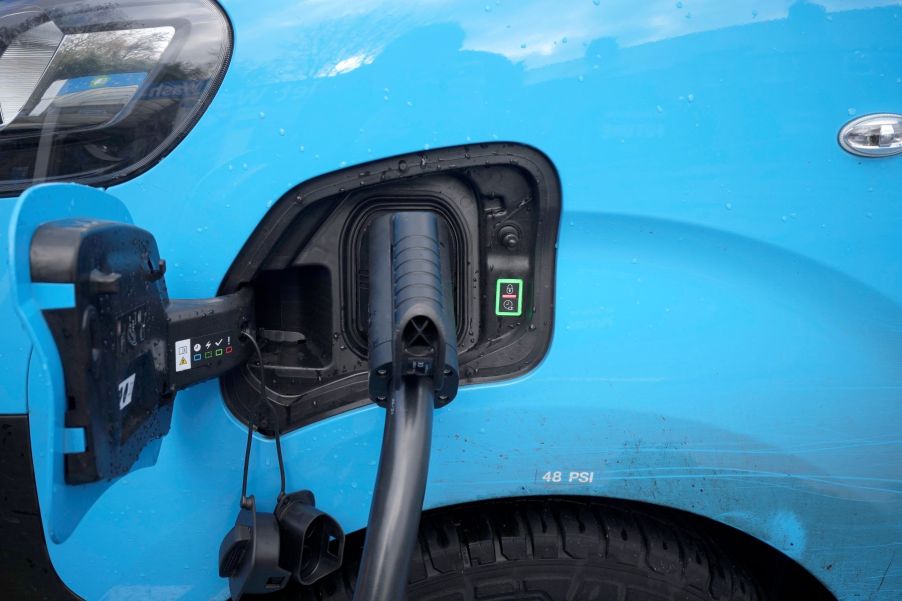
New Battery Technology Will Reportedly Revolutionize EV Charging
Range anxiety and scattershot public charging infrastructure aren’t the only reasons for the relatively slow rate of electric vehicle (EV) adoption in the U.S. EV battery-related issues often discourage consumers as well. However, an innovative battery developed by a new startup could be the breakthrough the auto industry needs to convince consumers that EVs truly are superior to their gas-guzzling counterparts.
Why batteries are a barrier to U.S. consumer electric vehicle adoption
It’s not just how far an EV can travel on a single charge that prospective buyers consider nowadays. Drivers want to know that they can charge their EVs quickly. You can fill a car’s gas tank in a matter of minutes. So, in an era where consumers value rapid fulfillment, many people want their EV charging times to be no longer than that of a gas-powered one.
Unfortunately, using fast-charging systems, most EVs can only charge to a fraction of their capacity (often up to 80%) in 20 minutes. While most EV drivers can charge their vehicle fully overnight using a home charging system, it’s nice to know that if you forget or something goes wrong, you can quickly and fully charge your EV on the go.
However, EV batteries that can charge much more quickly usually come with a caveat: a shorter working life. EV batteries typically last for between 500 and 3,000 charging cycles before they need to be replaced. The batteries that charge more quickly typically fall in the lower end of that range.
Prospective EV buyers, already put off by the higher upfront price and wondering whether the advertised range will be enough to keep them from being stranded, may also balk at an EV’s long charging times or long-term ownership costs inflated by frequent battery replacement costs. However, a new battery may change that.
Adden Energy’s new battery technology
A new piece on Medium highlights the benefits of a next-gen battery technology that could revolutionize EV car fueling operations. The battery can be charged in just three minutes. But unlike conventional batteries, these new batteries can also be recharged more than 10,000 times. Adden claims its batteries could last up to 20 years in an EV, compared to the standard three to six years you’d get out of a gas-powered car battery.
Unlike standard EV lithium-ion batteries in use, Adden Energy’s is solid state. Understanding why that’s important requires a basic knowledge of how lithium-ion batteries work. In a lithium-ion battery, you’ll find an electrolyte layer with a gel-like consistency that carries ions from one end to the other. However, during this process, some ions may build up on one end into a structure known as a dendrite. When the dendrite gets big enough to reach the other end, a short circuit occurs, and the battery must be replaced.
Adden uses a solid electrolyte layer that both improves the speed of ion transportation and slows the rate of dendrite formation. This approach does not address every issue that solid-state batteries present: heat management, material durability, and ion flow regulation. However, Adden seems to have overcome these issues through other engineering innovations, which the company has not made fully public.
Are EV batteries the only challenge?

While Adden is still bringing its battery to market, it’s a promising step toward greater EV adoption. Still, it’s not the only challenge that must be addressed. Many consumers still worry about range anxiety, despite plenty of headlines about new investments in public charging infrastructure. The truth is it both takes a while for individual stations to come online and longer still for consumers to realize that enough stations have come online in their area to quell their fears.
Furthermore, those ready to buy an EV may find doing so difficult. Federal tax credits have expired for many well-known EV brands. While new ones may be coming online for which the tax credits are available, some consumers may not want to take the chance on a brand or model with which they are unfamiliar.
Even those ready to take the plunge, unfamiliar brand or not, may find it hard to find the right EV on the lot. Cars have long relied on semiconductors, and EVs even more so. Automakers are still struggling with the global chip shortage and other supply chain issues that have made it difficult for many to fulfill demand. So, while demand among U.S. consumers is starting to accelerate, we’re still quite a ways off from them being the dominant vehicle on our roadways.


